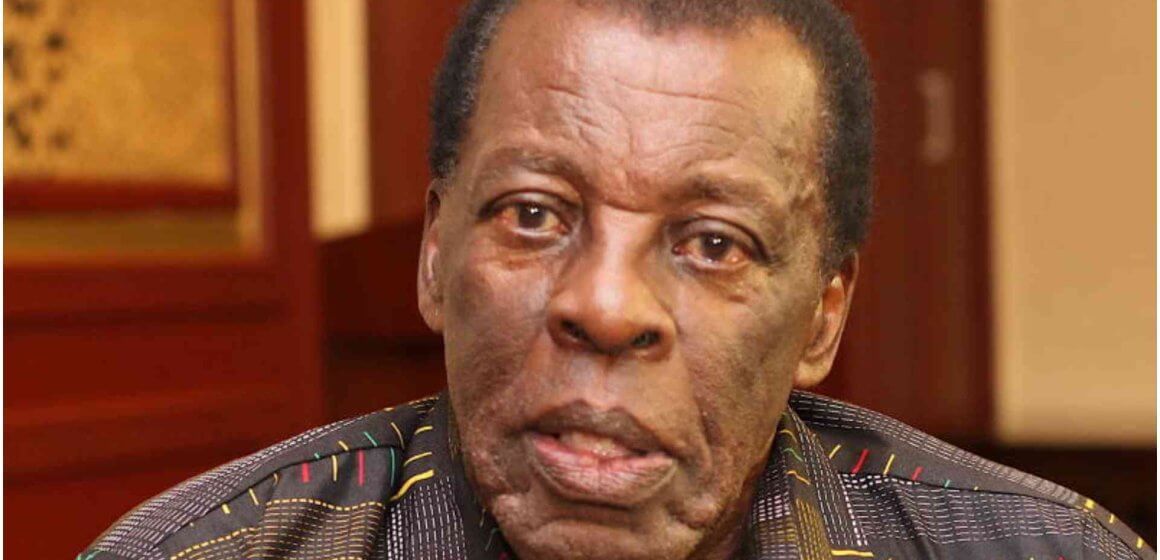|
LISTEN TO THIS THE AFRICANA VOICE ARTICLE NOW
Getting your Trinity Audio player ready...
|
Kenya is mourning the loss of one of its most iconic broadcasters, Leonard Mambo Mbotela, whose unmistakable voice dominated the airwaves for nearly six decades. Mbotela, 85, passed away on Friday, February 7, 2025, at 9:30 a.m., after a short illness, his family confirmed.
President William Ruto led the nation in paying tribute to the veteran journalist, describing him as a gifted communicator who played an integral role in shaping Kenya’s media industry. “We are heartbroken by the passing of Leonard Mambo Mbotela. His commanding voice and first-class football commentaries defined an era. He will be remembered for his outstanding contribution to broadcasting, particularly through his iconic programme Je, Huu Ni Ungwana?,” the president stated.
Beyond his broadcasts, Mbotela was also a mentor to young journalists, especially in Kiswahili reporting, a role President Ruto acknowledged in his tribute. “Mbotela’s dedication to nurturing new talent ensured that his legacy would live on through future generations,” he noted.
Born in 1940 in Mombasa, Mbotela’s deep passion for journalism saw him join the then Voice of Kenya (now Kenya Broadcasting Corporation – KBC) in 1964. He quickly rose to prominence with his eloquence, sharp analysis, and ability to connect with audiences. In 1966, he launched the radio show Je, Huu Ni Ungwana?, a Kiswahili program that humorously tackled social behaviors and ethics. The show, inspired by an incident where he witnessed a woman being arrested for stealing two packets of flour, became a staple in Kenyan homes and ran for over 50 years.
But beyond Je, Huu Ni Ungwana?, Mbotela was a versatile broadcaster, excelling in football commentary, crime awareness programs like Uhalifu Haulipi (Crime Does Not Pay), and language promotion through Ongea Lugha Sanifu. His deep, resonant voice became a fixture in Kenyan households, narrating historical events, major sports matches, and presidential functions.
One of the most dramatic and defining moments of Mbotela’s career came during the 1982 coup attempt against President Daniel arap Moi. On August 1, 1982, a faction of Kenya Air Force soldiers attempted to overthrow the government. In the chaos that ensued, rebel soldiers stormed the Voice of Kenya (VoK) offices and forced Mbotela at gunpoint to announce that the military had taken control of the country. His trembling but composed voice relayed the rebels’ message across the nation, making him one of the first people to confirm the coup.
However, the uprising was swiftly crushed by forces loyal to President Moi. Mbotela, still held captive by the rebels, was rescued by the military and taken to safety. That event cemented his place not only in broadcasting history but also in Kenya’s political narrative. Years later, he often recounted the terrifying ordeal, recalling how close he came to death and how his voice became a reluctant tool in one of Kenya’s darkest moments.
As news of Mbotela’s death spread, tributes poured in from all corners of the country. National Assembly Speaker Moses Wetangula described him as “a cultural custodian whose mastery of Kiswahili set the standard for Kenyan journalism.”
Veteran broadcaster Fred Obachi Machoka reflected on Mbotela’s lasting impact: “Because of you and other legends, we became who we are today. You shaped the world of broadcasting. Thank you for lending us Mzee for over 50 years.”
Former KBC programs controller Mary Masinde called him “a national treasure whose voice will forever echo in the history of Kenyan media.”
Having officially retired in 2022 after an incredible 58-year career, Mbotela remains Kenya’s longest-serving broadcaster. His deep, authoritative voice—once a daily companion to millions—may now be silent, but his influence will continue to shape journalism in Kenya for generations to come.
His family is expected to announce funeral arrangements in the coming days. Meanwhile, Kenyans continue to reflect on the life of a man whose voice not only entertained but also shaped a nation’s conscience.











LEAVE A COMMENT
You must be logged in to post a comment.